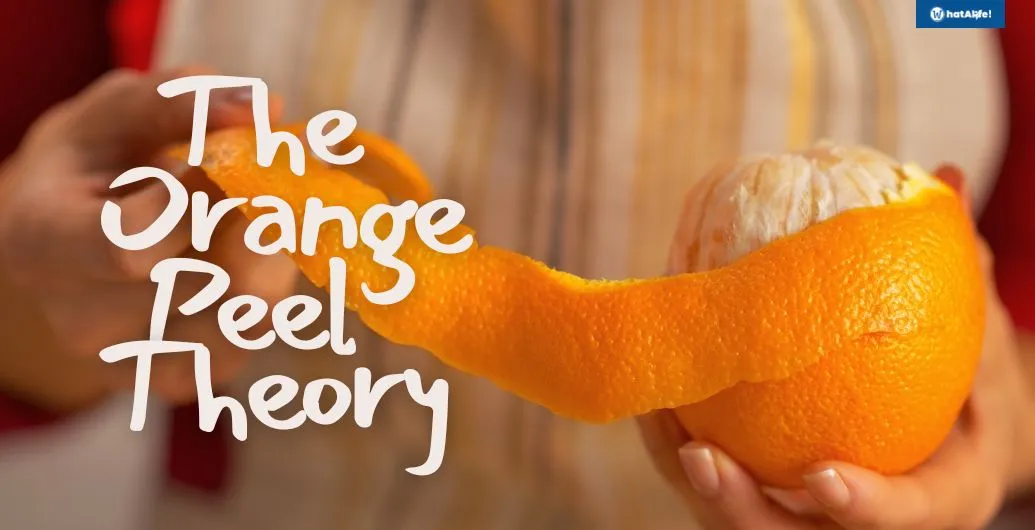Estimated reading time: 4 minutes
Suppose you want to test the depth of your partner’s love through an orange. One would ask, “can peeling an orange determine true love?” According to Independent, orange peel theory states that if your partner loves you, they will perform small tasks for you that you are perfectly capable of doing yourself such as peeling an orange. How did it start and why did it become popular on social media? Whether you’re curious or simply want to test your partner, we will define what orange peel theory is and why it became viral on TikTok.
What is the Orange Peel Theory?
A concept that has taken TikTok by storm, TIME defines the orange peel theory as the idea that small acts of service and your partner’s willingness to perform them indicate a healthy relationship.
Rooted to the principle that relationships are more about consistent, everyday interactions rather than grand gestures, Forbes stated that the orange peel theory aligns with the psychological concept of gestalt–the whole is greater than the sum of its parts.
Orange Peel Theory on Social Media
The theory got popular in November 2023 with a TikTok slideshow featuring texts between a former couple reminiscing their relationship.
“I miss when you would peel my oranges for me in the morning,” one text said. As the person explained that she would still get juice all over and stab her nails too deep whenever she does it herself.
The text messages end with a message that says, “I peeled my orange today,” delivered in green after a stream of blue messages. This indicates that the sender had been blocked. The video has been viral over 2.5 million views.
The theory has recently gone viral again when a woman named Shelby discusses the concept of acts of service in a relationship. In the video, she asks her boyfriend to peel an orange for her as an act of service. Unfortunately, he responds negatively, sparking controversy among viewers.
this made me physically ill https://t.co/WLD9EzRpzi pic.twitter.com/izFZGCav08
— ༻𝐦𝐞𝐞𝐬𝐡༺ (@mishricci) January 15, 2024
People are testing the Orange Peel Theory on TikTok:
@angelac0123 Did he pass??😭😂
♬ original sound – Angela
Several users asked “what is the orange peel theory?” in the comment section.
@kyleandjade_ He’s a walking green flag 🥹 #fyp #orangepeeltheory ♬ Ylang Ylang – 𝓒 𝓸 𝓸 𝓧 𝓲 𝓷 𝓱 ♫
While others urge men to take notes.
@abbieherbert NOT THE REACTION I WAS EXPECTING 😂
♬ Ladyfingers by Herb Alpert and The Tijuana Brass – Mieze Katz
One user commented, “I can’t decide if he passed or failed.”
@montanaandryan Wait this was so cute 🥹 #bloompartner ♬ original sound – Montana & Ryan
Another user said, “he’s def seen the trend lmao”
Dating and relationship coach Kate Mansfield stated that a general sign of a healthy relationship involves genuine, reciprocal interest in what makes our partner happy. “Beware of oversimplification,” she warns. “We all need to be willing to accommodate and satisfy our partner’s needs and wants – but only up to a point. Balance here is key and getting super specific in this way. Creating an oversimplification, can cause people to believe that they are not loved. In fact there is just a lack of agreed-upon expectations and boundaries in the relationship.” Mansfield added.
Kate Truitt, a board-certified psychologist and applied neuroscientist, has shared a statement. According to her, the orange peel theory shows care, love, and commitment. The repetition of the act enhances the overall health and happiness of the relationship. “Often simple and seemingly mundane, these gestures are pivotal in nurturing a loving, supportive and enduring relationship.”
However, relationship coach Jane Parker calls the theory a “generalization” which means that it only holds up for certain types of people. She stated, “If your love language is ‘acts of service’, then it could be a valid need in the relationship that your partner also likes to show love by doing things for you. To some, it would be very important, as they perceive doing simple tasks such as making a cup of tea as an act of love. For others, it is not necessary or important and they perceive love and feel loved in different ways.”
The theory of love languages suggests five main ways of expressing love. If a partner consistently refuses to accommodate small acts of love, it could indicate an unbalanced or toxic relationship. It’s crucial to communicate openly about what one wants in a relationship. If a partner understands what is meaningful to you and still refuses, your needs may not be met in the relationship.
In discussing the application of this relationship theory to TikTok, Mansfield stated, “Testing our partner to measure their level of love based on social media trends is a risky game.” Experts warn that this kind of social experiment is definitely not conducive to a healthy relationship. “We get to know people over time, through many interactions and responses. To judge someone on one response to that test would be unfair and could be inaccurate.” Parker added.
The Bottom Line
While an interesting social media trend, orange peel theory should not be the sole determinant of the health of a relationship.
Small acts of love and service are indeed important. But they should be viewed in the context of the overall relationship.
Experts stress the importance of open communication and understanding each other’s love languages. Social media trends can spark conversation and introspection, but they shouldn’t replace genuine understanding and commitment in a relationship.

Leave a Reply